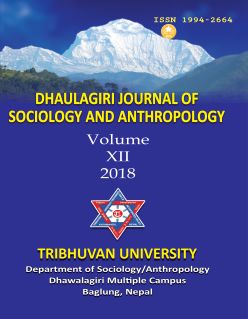Teacher: An Important but Less Recognized Actor of School Curriculum Development in Nepal
DOI:
https://doi.org/10.3126/dsaj.v12i0.22181Keywords:
School education, curriculum development, teacher's role, expertsAbstract
Curriculum development is considered as a key factor in the process of educational transformation. In this process, teachers can play multiple roles such as translator of learning objectives into outcome, mediator between curriculum and students and so on. On the other hand, curriculum experts contribute to making a need assessment and contents development on the basis of educational theories and principles. But, contemporary literatures point gaps in exchange of knowledge and expertise between these two important actors of school curriculum development. On this backdrop, this study aims to explore what rolesteachers can perform and how their rolesare acknowledged in the curriculum development. Following social constructivist worldview, this study adopted qualitative approach with the scientific tool of in-depth interviewsand purposive sampling design. This study reveals teacher’s contribution inidentification of practical educational needsin the context of changing overall societal needs.Moreover, the teacherscan bridge existing gaps between national educational goals, social needs and the interest of people. But the current school curriculum development process takes place at the top where curriculum experts play decisive role. These experts seek school teacher’s contribution only at the review phase of curriculum development process which is not enough to incorporate teacher’s expertise. In this respect, teachers will be able to view curriculum not in terms of content to be covered, but as a transformative process. Rather, this looks like just maintaining a formality. The attitudinal and procedural process constrain in recognition and involvement of teacher in curriculum development process. Thus, school curriculum has missed opportunity to reflect local need and increase ownership of the teachers. This paper argues for the recognition of teacher’s role as a critical practitioner and change agent, and urges to provide sufficient space to incorporate their real-life experiences in school curriculum.




